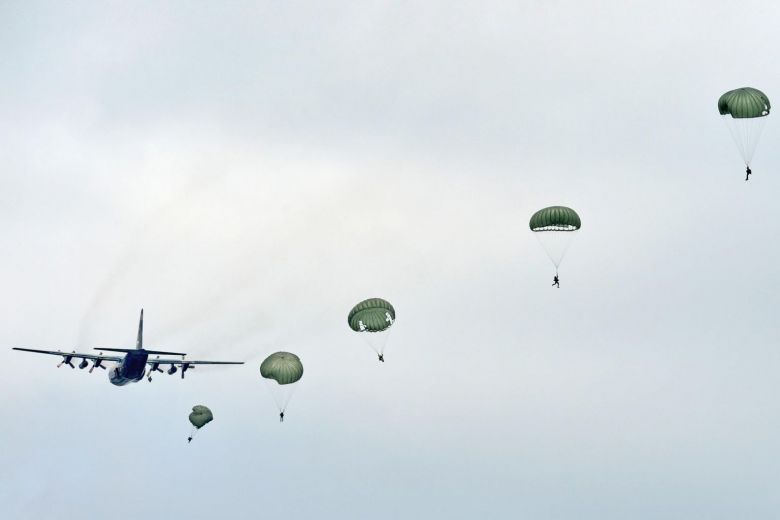SAF resumes parachute training after 4-month suspension due to training incident
Sign up now: Get ST's newsletters delivered to your inbox

In a photo taken on May 14, 2013, a string of parachutes blooms behind a C-130 Hercules.
PHOTO: ST FILE
Follow topic:
SINGAPORE - After a four-month suspension due to a training incident, the Singapore Armed Forces (SAF) resumed parachute jump training involving cords on Tuesday (April 28), but with new safety measures.
These measures include enhanced emergency stop drills, greater supervision of less-experienced jumpers, and lowering the rate of dispatching trainees for jumps so that trainers have more time to react if they need to intervene.
The training had been halted following an incident that resulted in Private Joshua Quek suffering a cervical spine injury in Taiwan last December.
He was discharged from hospital last month and has been recovering at home, after he was flown back in January.
The 21-year-old full-time national serviceman was doing his fifth and final jump for his Basic Airborne Course at night last December, when the cord that attached his parachute to the aircraft - called the static line - swept across his neck as he exited the plane.
A Singapore Army Facebook post on Tuesday said that trainees from the commando formation executed live jumps as part of the 240th Airborne Training Course, with improved safety measures.
Image-capturing devices are now mounted on the helmets of jump masters and parachute jump instructors on board, so that the jump training can be recorded and reviews can be done with the jumpers after the training is over.
Another new safety measure was to add a physical marking on the static line, so that how slack the line is can be seen more easily.
For courses that involve less-experienced jumpers, a third jump master will be appointed to provide more supervision. For all jumps, a qualified jump instructor is required to be on board the plane with two qualified jump masters at the exit door to check that proper measures are followed.
The Singapore Army added that each jumper is now issued a walkie-talkie and will inform a person in-charge when he has landed safely.
For night jumps, jumpers must switch off their green blinking light and infra-red strobe light when they have landed safely.
The enhanced safety measures were recommended by a Board of Inquiry that was convened to investigate the incident, examine safety procedures and recommend areas for improvement.
The measures were reviewed by the Army Safety Board and validated through trial jumps conducted by regular commando soldiers, including the Chief Commando Officer, Colonel Kenny Tay.
The SAF conducts about 6,000 static-line parachute jumps every year. Since 1974, about 27,000 trainees have graduated from the SAF's Basic Airborne Course.
The incident involving Pte Quek was the first known "static line interference" incident resulting in serious injury, said Defence Minister Ng Eng Hen in a written parliamentary reply in January on the incident. This happens when the static line is too slack and interferes with a jumper's exit from the plane.
This training activity is standard airborne training conducted by militaries to teach soldiers the fundamentals of parachuting for combat deployment, Dr Ng said then.
Col Tay said in the Singapore Army's Facebook post on Tuesday that the enhanced safety measures will further strengthen parachute training safety and reduce risk.
"Trainees can continue to hone their competency to meet mission requirements, while remaining confident in the safety processes and procedures in place," he said.
Col Tay, who did the first jump since the resumption of training as part of his regular jumps, added that he checked in with Pte Quek recently.
Pte Quek's injury resulted in neurological deficits, including weakness of his upper and lower limbs, and Dr Ng had said in January that he would require rehabilitation and physiotherapy for long-term recovery.
Col Tay said: "He is recovering well at home, following his discharge from hospital early last month. We will continue to support Joshua and his family as he continues on the road to recovery."

